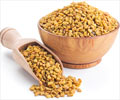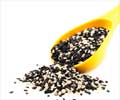Fenugreek seeds (Trigonella foenum graecum) are extensively used in the Indian cuisine. It does not only impart distinctive flavor, but it also has therapeutic properties. The seeds are known for their characteristic smell, but the use is limited by its bitter taste.
Traditionally, fenugreek seeds are used for the treatment of diabetes, cough, and flatulence, to increase breast milk production, and for anti-inflammatory and aphrodisiac effects. Fenugreek seeds are used in both Ayurvedic and traditional Chinese medicine. Fenugreek seeds can be used both whole and in powdered form as a spice.Fenugreek for Diabetes
Fenugreek seeds have antidiabetic properties that help in the prevention and treatment of diabetes in several ways. Diabetes is a metabolic condition in which the blood glucose levels are higher than normal.The two types of diabetes are type 1 and type 2 diabetes. In type 1 diabetes there is insufficient insulin to unlock the cells. In type 2 diabetes, the body does not use insulin properly.According to a study conducted by Indian researchers, adding 100 grams of fenugreek powder to the daily diet of patients with type 1 diabetes reduced their fasting blood glucose levels and improved glucose tolerance. Findings of another clinical trial suggest that incorporating 15 grams of fenugreek powder to the diet taken by people with type 2 diabetes reduced the rise in post-meal blood glucose level.
As per a study published in the International Journal of Information Research and Review, the levels of HbA1c reduced in patients with type 2 diabetes who were taking fenugreek alone without medications for diabetes. The study recommends that fenugreek is safe and may be considered in patients with HBA1c <8% as a potential means to lower the high levels of HbA1c.
The antidiabetic properties of fenugreek seeds are attributed to the active substances it contains such as saponins, diosgenin, 4-hydroxyisoleucin (4-OH-Ile) galactomannan, and trigonelline. These substances demonstrate antidiabetic properties of fenugreek seeds. Fenugreek seeds contain 50% saponins, which reduce the rate of glucose absorption in the digestive tract. 4-hydroxyisoleucin stimulates insulin secretion from the pancreas and also decreases insulin resistance, galactomannan helps in glucose resorption and trigonelline improves B-cells regeneration. Clinical trials indicate that these active substances have a potential to become a source of new anti-diabetic medication.
Studies indicate that fenugreek seeds are beneficial to treat type-1 and type-2 diabetes. It is more commonly prescribed by practitioners of alternative medicine. According to a study published in the Journal of Diabetes and Metabolic Disorders, five grams of fenugreek seeds powder was given to type 2 diabetics twice a day before meals for three months, the results showed a significant decline in fasting plasma glucose (FPG), postprandial plasma glucose (PPPG) and low-density lipoprotein cholesterol (LDLc). Fenugreek seeds as a dietary supplement can be used for patients with impaired glucose tolerance and could benefit from a low-risk, inexpensive, food-based intervention.
Ways to Include Fenugreek Seeds in Your Diet
Fenugreek seeds can be dry roasted on medium heat for a couple of minutes. One or two tablespoons of the roasted fenugreek seeds can be added to recipes. Two tablespoons of fenugreek seeds boiled in a cup of water for about ten minutes can be taken as a tea twice a day. For people who do not like the taste of fenugreek seeds, capsules can be a better alternative. The recommended dosage for fenugreek seeds to lower blood glucose level is between 2.5-15 grams daily. Some studies suggest that 2.5 grams of fenugreek seeds powder twice a day are beneficial.Caution
Fenugreek seeds can be taken to lower blood sugar levels by taking it as a supplement or adding fenugreek seeds to recipes or drinking it as a tea. Fenugreek does help lower blood sugar levels but it can also interact with medications prescribed for diabetes as well as some blood thinners. So, ensure that you consult your doctor before including any herbal medicines to your regimen, especially if you are already taking medications for diabetes.References:
1. http://www.ncbi.nlm.nih.gov/pubmed/264360693. http://www.diabetesaction.org/site/PageServer?pagename=complementary_july_06
Source-Medindia














